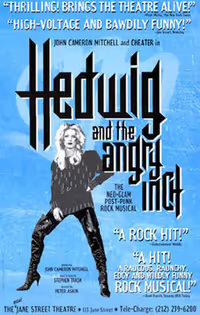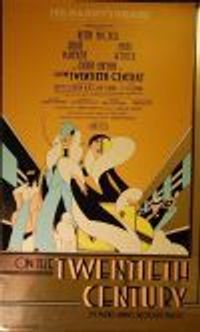Casting without Considering Appearance
#1Casting without Considering Appearance
Posted: 1/13/13 at 8:12pm
I’m curious how people feel about casting actors with a visibly different ethnicity or appearance from the character they’re playing. I think it’s generally unreasonable for a white actor to play a minority character, largely because of the shortage of good roles for minority actors. (Johnny Depp’s casting as Tonto in the new Lone Ranger movie is an exception in my view because Johnny Depp is Johnny Depp.)
What about the reverse situation, when minority actors play white characters? I never saw Robert Guillaume as the Phantom of the Opera, but I assume he was playing the character as a white man – if the Phantom is black, wouldn’t his mistreatment at French society’s hands partially stem from race prejudice rather than only fear about his deformity? While that’s an interesting story to tell, it’s not the one that the playwright had in mind.
Especially in a musical, the audience must suspend disbelief anyway. A good enough actor should be able to master the mannerisms necessary to play Tevye or Henry Higgins or Jean Valjean, regardless of the actor’s skin tone. What about if it’s not skin color, however, but weight or height or even sex? Would an overweight Phantom be believable running around on catwalks and climbing ropes? How about a 65-year-old female Curly in Oklahoma? I think my head is starting to spin. So have at it, everyone!
#2Casting without Considering Appearance
Posted: 1/13/13 at 8:16pmI want to see a fat Jesus in JCS. (And no, I don't mean Zach Galifianakis.)
Broadway Legend
joined: 5/1/05
Blocked: After Eight, suestorm, david_fick, emlodik, lovebwy, Dave28282, joevitus, BorisTomashevsky, Seb28
#2Casting without Considering Appearance
Posted: 1/13/13 at 8:17pm
White people should play white people. Black people should play black people. Mexicans should play Mexicans. Skinny people should play skinny people. Fat people should play fat people.
A skinny Carlotta won't work.
Let's leave it at that.
#3Casting without Considering Appearance
Posted: 1/13/13 at 8:20pm
It depends on the style of the play. Naturalism tends to demand careful visual verisimilitude, which is only one reason why it's a style we should probably relegate to museum revivals.
Different countries have different racial definitions and histories. African-Americans (including Josephine Baker, Eartha Kitt and numerous jazz artists) have traditionally taken refuge in France because black people were treated better there. (To be an Arab in France was another matter.)
As for Guillaume, I'm sure audiences noticed his Phantom was black, but I've never heard anyone say it was an issue for them. Neither the play nor the character are exactly Naturalistic anyway. Why shouldn't the Phantom be French-African?
Rainbowhigh23
Broadway Legend Joined: 3/29/12
#4Casting without Considering Appearance
Posted: 1/13/13 at 8:31pmThere was a recent off-Broadway production of Next to Normal in which Diana was played by an African-American woman. I heard it just didn't make sense when the kids were played by white actors.
#5Casting without Considering Appearance
Posted: 1/13/13 at 8:33pm
Didn't make sense to whom? I don't see the problem except that we're used to "white" families looking a certain way and "mixed-race" families looking another. We'll get over it.
Updated On: 1/13/13 at 08:33 PM
Rainbowhigh23
Broadway Legend Joined: 3/29/12
#6Casting without Considering Appearance
Posted: 1/13/13 at 8:38pmThe person I know who saw it said that Gabe and Natalie did not look mixed race at all, so to them it looked strange. Nothing against mixed race couples.
#7Casting without Considering Appearance
Posted: 1/13/13 at 8:38pmIn my opinion, if the character's physical appearance is important to the plot, or if it is very specifically stated within the material, then it should be considered in casting. The way people look is a part of who they are. When writers craft characters, I guarantee you they do not do so without considering appearance, so why would we not consider it when casting the roles they write?
#8Casting without Considering Appearance
Posted: 1/13/13 at 8:40pma skinny Carlotta won't work? Obviously you didn't see Rosie Ashe who created the part in London and is on the original cast recording. She worked just fine and is certainly not a big woman.
#9Casting without Considering Appearance
Posted: 1/13/13 at 8:46pmI'd like to see an all dead cast of CATS.
#10Casting without Considering Appearance
Posted: 1/13/13 at 8:47pmPearl Sun, who's Asian American, was Alice Ripley's understudy on the Next To Normal tour.
#11Casting without Considering Appearance
Posted: 1/13/13 at 8:52pm
I've seen a trim Carlotta as well as an African-American one, and it didn't bother me.
#12Casting without Considering Appearance
Posted: 1/13/13 at 8:56pm
White people should play white people. Black people should play black people. Mexicans should play Mexicans. Skinny people should play skinny people. Fat people should play fat people.
I seriously hope this was a joke. By your way of thinking we would have missed out on some wonderful performances by some amazingly talented and gifted people. Two that come to mind: Norm Lewis as Javert and Lea Salonga as Eponine in Les Miserables.
#13Casting without Considering Appearance
Posted: 1/13/13 at 9:03pm
There was some yahoo on here that argued that the black Billy (Billy Elliot) ruined it for him. He just kept harping on it.
The only time I think its an issue is when the show is ABOUT race.
#14Casting without Considering Appearance
Posted: 1/13/13 at 9:09pm
You couldn't have an African-American playing Mother in Ragtime. It wouldn't work.
#15Casting without Considering Appearance
Posted: 1/13/13 at 9:19pm
The only time I think its an issue is when the show is ABOUT race.
This is true...but I am going to play devil's advocate here. In The Heights, a show about Hispanics actually had two non Hispanics in Hispanic roles: Jordin Sparks and Corbin Bleu.
#16Casting without Considering Appearance
Posted: 1/13/13 at 9:21pm
I seriously hope this was a joke. By your way of thinking we would have missed out on some wonderful performances by some amazingly talented and gifted people. Two that come to mind: Norm Lewis as Javert and Lea Salonga as Eponine in Les Miserables.
No, that was not a joke. I meant when it is crucial to the plot. No where in Les Mis does it state that Javert or Eponine are white, so those roles can be plausibly played by any race. When it is ironic, that is a different story. Like the white Gary Coleman in Avenue Q: Student Edition. That is laughable. But a white Deloris van Cartier just isn't right.
#17Casting without Considering Appearance
Posted: 1/13/13 at 9:30pmWhy couldn't Deloris be white? Where does it say she has to be African-American? Because Whoopi Goldberg played the role in the film? (Yes I know the lead in the musical was African-American. But, why wouldn't it be plausible for a white woman to play her?)
#18Casting without Considering Appearance
Posted: 1/13/13 at 9:36pm
A white Delores in Sister Act would be an interesting experiment that I'm not sure would work.
The film role was written for Bette Midler. When Midler passed and Whoopi took the role, her one caveat was that she play the role "as written," and not have the character rewritten for a "black actor" (actor, not actress, since Whoopi insists that 'actress' is a demeaning and limiting term). As such, she played the role not as a black person, but as a person who happened to be black- essentially the same way Bette would have played it, but with Whoopi's signature delivery.
By Sister Act 2, Delores was a well known character, one NOT being written with anyone in mind but Whoopi Goldberg. More to the point- they knew Delores was black, and wrote her as a specifically racialized character. Hence, "Sister Act 2" feels like a much blacker movie than Sister Act 1 did, even down to contemporary hip-hop and R&B replacing the soul and Vegas music of the first film.
The musical Delores is even more characteristically "black" than the Delores of Sister Act 2.
#19Casting without Considering Appearance
Posted: 1/13/13 at 9:42pmThe reason I say that a white Deloris won't work is because she is a somewhat well known character from the movies, audiences seeing a white woman in her role on stage might be confused. They will EXPECT a black person. I can guarantee that a SISTER ACT revival with a white Deloris will do even worse than than the first one did.
#20Casting without Considering Appearance
Posted: 1/13/13 at 9:46pmdarquegk, what do you mean "When Midler Passed"? She is still alive. Or do you mean passed up the role? Sorry if this sound dumb, but I'm confused.
#21Casting without Considering Appearance
Posted: 1/13/13 at 9:48pmYou can guarantee that? Really? I mean if you had someone who was a big enough name I think it could be marketable.
#22Casting without Considering Appearance
Posted: 1/13/13 at 9:56pmYes, I can guarantee that. (I'm sorry if this sounds snarky, but I am 99.9999999999999% sure of this.)
#23Casting without Considering Appearance
Posted: 1/13/13 at 9:56pmYes, I can guarantee that. (I'm sorry if this sounds snarky, but I am 99.9999999999999% sure of this.)
#24Casting without Considering Appearance
Posted: 1/13/13 at 10:00pm
DramaMama wrote: The only time I think its an issue is when the show is ABOUT race.
I don't know if that's the ONLY time race (or should I say appearance) matters. For example, when the character is a historical figure, such as Margaret Thatcher or Eleanor Roosevelt, it would be strange to have someone who looks really different. A different race would be fine in my view, if the actors otherwise look similar. Many years ago, there was a TV special in which the actor playing, I think, Anwar Sadat, died. They replaced him with a well-known black actor who looked so much like him it was amazing.
Also, it's possible for a show to be about race in a sub rosa way. For example, My Fair Lady is about what makes someone appear to be upper or lower class in Edwardian England. The British would never have accepted a black individual or a native of India as upper class. Race is therefore a subtext. On the other hand, in the recent Arena Stage production of My Fair Lady, Alfred P. Doolittle was played by an Asian actor. It worked, probably because he had a perfect Cockney accent, which telegraphed that he was playing a native-born (white) Londoner. I really doubt that any actor who can't do the accents properly can play in My Fair Lady no matter what he or she looks like.
Videos











